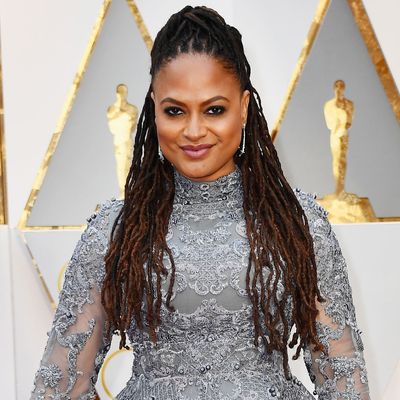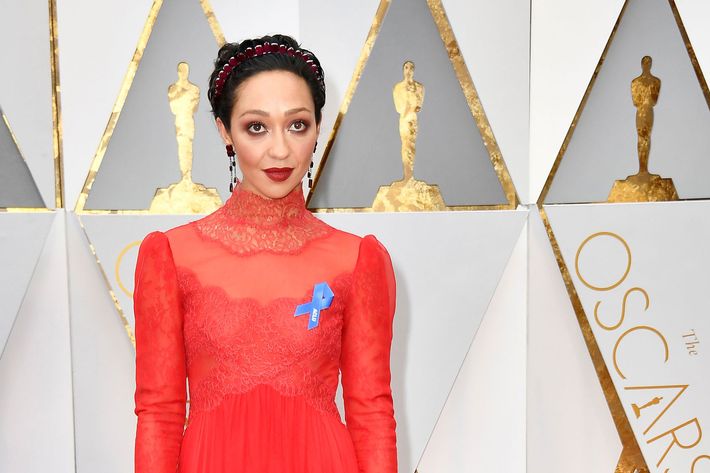
After several artists at the Grammys used the stage to call out Donald Trump or to draw attention to causes that were important to them, the 2017 Oscars seemed destined to get just as political, if not more so. Most of Hollywood has made its opinion of the Trump administration clear, and on Sunday night, filmmakers and stars used everything from red-carpet gowns to acceptance speeches to amplify messages of tolerance and inclusion. Here’s a roundup of the Oscars’ most political moments.
The blue ribbons

Long before the ceremony began, stars like Ruth Negga, Busy Phillips, Karlie Kloss, and Lin Manuel-Miranda pinned blue ribbons to their red-carpet looks to show support for the American Civil Liberties Union. The ACLU filed a lawsuit over Trump’s travel ban, and a judge ruled in the organization’s favor, temporarily blocking it. The ribbons were part of the “Stand With the ACLU” campaign that launched this week.
Ava DuVernay’s dress
The director chose a dress from a Lebanese designer, making her stance on Trump’s travel ban clear.
She also posted a photo to her Twitter page before the ceremony honoring Trayvon Martin, who was shot and killed on February 26, 2012.
Jimmy Kimmel’s Trump jokes
Kimmel made at least three Trump jokes in his opening monologue alone, but one of the best came later, when he poked fun at the president’s comment that Meryl Streep is “overrated.” “Meryl Streep has phoned it in on more than 50 films over the course of her lackluster career,” Kimmel said before asking her to stand so the audience could applaud her.“Nice dress, by the way,” he added. “Is that an Ivanka?”
Asghar Farhadi’s boycott
Iranian director Asghar Farhadi wasn’t at the Oscars to accept the award for Best Foreign Language Film for his movie, The Salesman. He announced he’d skip the ceremony after Trump issued his travel ban. Instead, Anousheh Ansari, the first astronaut of Iranian descent, accepted the award on Farhadi’s behalf and read his remarks out loud. “Dividing the world into the us and our enemies categories creates fear,” the statement read — it also called the travel ban an “inhumane law that bans entry of immigrants into the U.S.”
Gael García Bernal’s speech
The Mexican actor and filmmaker presented the award for best animated feature film alongside Hailee Steinfeld, and he used the moment to take on Trump’s fondness for walls. “Flesh-and-blood actors are migrant workers; we travel all over the world, we build families, we construct stories, we build life, and cannot be divided,” he said. “As a Mexican, as a Latin American, as a migrant worker, as a human being, I’m against any form of wall that wants to separate us.”
Orlando von Einsiedel’s speech
When Orlando von Einsiedel and Joanna Natasegara, director and producer of White Helmets, took the stage to accept the award for best short documentary, they asked the audience to call for an end to Syria’s six-year civil war, which lead to a standing ovation. The film tells the story of the White Helmets, a volunteer rescue group that operates in war-torn areas of Syria, and von Einsiedel read a statement from the group’s founder that quoted from the Quran.
“We are so grateful that this film has highlighted our work to the world. Our organisation is guided by a verse from the Quran: to save one life is to save all of humanity,” the statement said. “We have saved more than 82,000 Syrian lives. I invite anyone here who hears me to work on the side of life to stop the bloodshed in Syria and around the world.”
Barry Jenkins and Tarell Alvin McCraney’s speech
Thanks to the best picture mix-up, the Moonlight team didn’t get to speak following the film’s win. But earlier in the evening, when it won for best adapted screenplay, Moonlight writer-director Barry Jenkins and playwright Tarell Alvin McCraney accepted the award with a bit of political commentary. “All you people out there who feel there’s no mirror for you, that your life is not reflected, the Academy has your back, the ACLU has your back, we have your back, and for the next four years we will not leave you alone, we will not forget you,” Jenkins said. McCraney added: “This goes out to all those black and brown boys and girls and non-gender-conforming, who don’t see themselves, we’re trying to show you, you and us. So thank you, thank you. This is for you.”




